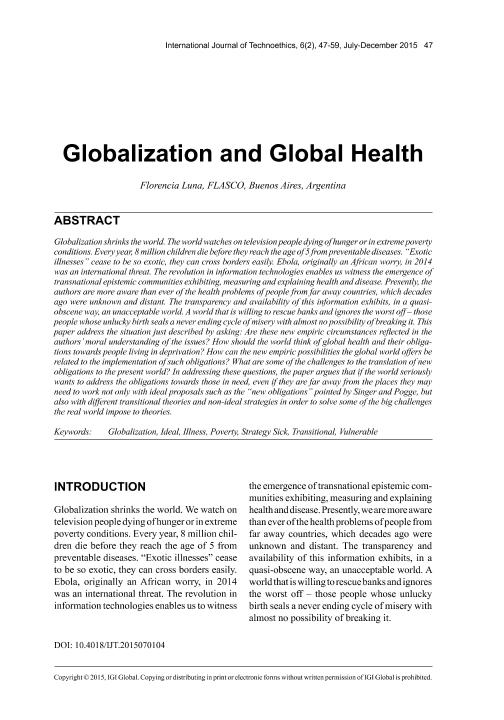Mostrar el registro sencillo del ítem
dc.contributor.author
Luna, Florencia

dc.date.available
2018-08-14T18:18:37Z
dc.date.issued
2015-07
dc.identifier.citation
Luna, Florencia; Globalization and Global health; IGI Global; International Journal of Technoethics; 6; 2; 7-2015; 47-59
dc.identifier.issn
1947-346X
dc.identifier.uri
http://hdl.handle.net/11336/55448
dc.description.abstract
Globalization shrinks the world. The world watches on television people dying of hunger or in extreme poverty conditions. Every year, 8 million children die before they reach the age of 5 from preventable diseases. "Exotic illnesses" cease to be so exotic, they can cross borders easily. Ebola, originally an African worry, in 2014 was an international threat. The revolution in information technologies enables us witness the emergence of transnational epistemic communities exhibiting, measuring and explaining health and disease. Presently, the authors are more aware than ever of the health problems of people from far away countries, which decades ago were unknown and distant. The transparency and availability of this information exhibits, in a quasiobscene way, an unacceptable world. A world that is willing to rescue banks and ignores the worst off - those people whose unlucky birth seals a never ending cycle of misery with almost no possibility of breaking it. This paper address the situation just described by asking: Are these new empiric circumstances refected in the authors' moral understanding of the issues? How should the world think of global health and their obligations towards people living in deprivation? How can the new empiric possibilities the global world offers be related to the implementation of such obligations? What are some of the challenges to the translation of new obligations to the present world? In addressing these questions, the paper argues that if the world seriously wants to address the obligations towards those in need, even if they are far away from the places they may need to work not only with ideal proposals such as the "new obligations" pointed by Singer and Pogge, but also with different transitional theories and non-ideal strategies in order to solve some of the big challenges the real world impose to theories.
dc.format
application/pdf
dc.language.iso
eng
dc.publisher
IGI Global
dc.rights
info:eu-repo/semantics/openAccess
dc.rights.uri
https://creativecommons.org/licenses/by-nc-sa/2.5/ar/
dc.subject
Globalization
dc.subject
Ideal
dc.subject
Illness
dc.subject
Poverty
dc.subject
Strategy Sick
dc.subject
Transitional
dc.subject
Vulnerable
dc.subject.classification
Salud Ocupacional

dc.subject.classification
Ciencias de la Salud

dc.subject.classification
CIENCIAS MÉDICAS Y DE LA SALUD

dc.title
Globalization and Global health
dc.type
info:eu-repo/semantics/article
dc.type
info:ar-repo/semantics/artículo
dc.type
info:eu-repo/semantics/publishedVersion
dc.date.updated
2018-08-13T14:51:40Z
dc.journal.volume
6
dc.journal.number
2
dc.journal.pagination
47-59
dc.journal.pais
Alemania

dc.journal.ciudad
Berlin
dc.description.fil
Fil: Luna, Florencia. Consejo Nacional de Investigaciones Científicas y Técnicas; Argentina. Facultad Latinoamericana de Ciencias Sociales; Argentina
dc.journal.title
International Journal of Technoethics
dc.relation.alternativeid
info:eu-repo/semantics/altIdentifier/doi/https://dx.doi.org/10.4018/IJT.2015070104
dc.relation.alternativeid
info:eu-repo/semantics/altIdentifier/url/https://www.igi-global.com/gateway/article/131423
Archivos asociados
